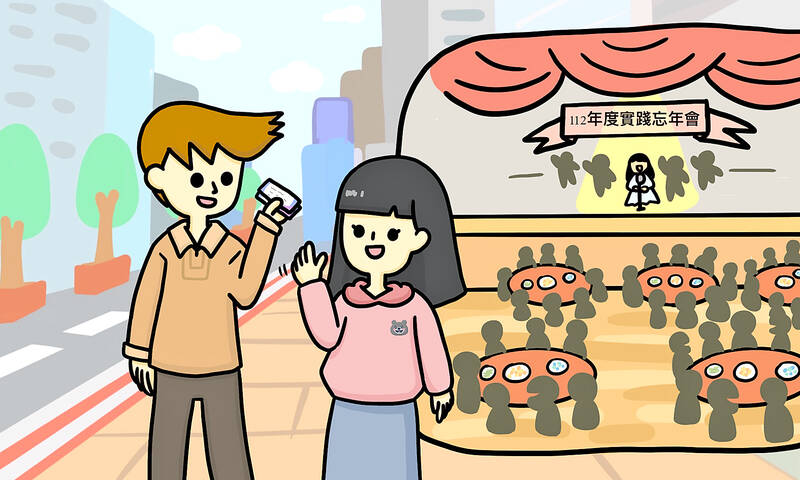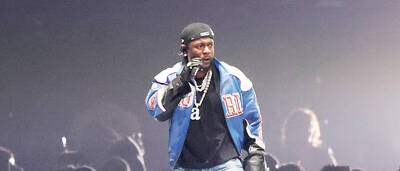對話 Dialogue
馬克:小實,下週五晚上要不要一起去看電影?
Mǎkè: Xiǎoshí, xià zhōu wǔ wǎnshàng yào búyào yìqǐ qù kàn diànyǐng?

小實:不行耶,我答應我媽媽要陪他一起去公司的尾牙。
Xiǎoshí: Bùxíng yé, wǒ dāyìng wǒ māma yào péi tā yìqǐ qù gōngsī de wěi yá.
馬克:「尾牙」?那是什麼活動?
Mǎkè: “wěiyá”? Nà shì shénme huódòng?
小實:是公司舉辦餐會,感謝員工這一年的付出。
Xiǎoshí: Shì gōngsī jǔbàn cān huì, gǎnxiè yuángōng zhè yì nián de fùchū.
馬克:好特別喔,像是公司聚餐嗎?
Mǎkè: Hǎo tèbié ō, xiàng shì gōngsī jùcān ma?
小實:沒錯,有些大公司還會租借體育場請藝人來表演喔。
Xiǎoshí: Méicuò, yǒuxiē dà gōngsī hái huì zūjiè tǐyùchǎng qǐng yìrén lái biǎoyǎn ō.
馬克:哇!聽起來非常熱鬧!
Mǎkè: Wa! Tīng qǐlái fēicháng rènào!
小實:有時候還有抽獎活動,讓員工都能開心的迎接新年!
Xiǎoshí: Yǒu shíhòu hái yǒu chōujiǎng huódòng, ràng yuángōng dōu néng kāixīn de yíngjiē xīnnián!
馬克:希望我以後工作的公司也有這種福利!
Mǎkè: Xīwàng wǒ yǐhòu gōngzuò de gōngsī yěyǒu zhè zhǒng fúlì.
翻譯 Translation
Mark: Xiaoshi, do you want to go see a movie together next Friday night?
Xiaoshi: No, I promised my mother that I would go with her to the company’s year-end party.
Mark: “Year-end party”? What’s that, then?
Xiaoshi: The company is holding a dinner to thank employees for their hard work throughout the year.
Mark: That sounds great. Is it like a corporate banquet?
Xiaomi: Yes, some big companies will rent stadiums and invite artists to perform.
Mark: Wow! Sounds like a lot of fun!
Xiaoshi: Sometimes there are lucky draws so that employees can ring in the New Year with a smile.
Mark: I hope the company I work for in the future will provide such fantastic perks!
單字片語 Vocabulary
1. 尾牙 (wěiyá) year-end party
2. 付出 (fùchū) to pay, effort, hard work
3. 聚餐 (jùcān) dine together
4. 租借 (zūjiè) to lease
5. 藝人 (yìrén) artist, performer
6. 表演 (biǎoyǎn) performance
7. 抽獎 (chōujiǎng) lottery, lucky draw
8. 員工 (yuángōng) staff, employee
9. 迎接 (yíngjiē) to ring in (new year)
10. 福利 (fúlì) welfare, perks (of a job)
教材音檔 Audio Files
教材影片 Video Files:
https://www.instagram.com/celc.nou_tw/guide/_/17999106352646292/
實踐大學華語中心提供
By Shih Chien University Chinese Language Center: https://chineseusc.com/

A: Happy New Year! I can’t believe it’s 2026 already. Where did you count down? B: I went to pop singer A-mei’s Taitung concert yesterday for the New Year’s countdown. How about you? A: I went to rock band Mayday’s Taichung concert yesterday. Going to their New Year’s shows has become a holiday tradition for me. B: Don’t forget, we’re also going to Jolin Tsai’s show tonight. It’s her first perfomance at the Taipei Dome. A: Yeah, that’s right. It’s great to start the year with good friends and good music. A: 新年快樂!我真不敢相信都已經2026年了。你昨天去哪跨年啦? B: 我昨天去了流行天后張惠妹的台東演唱會,還和她一起跨年倒數。那你呢? A:

Prompted by military threats from Russia, Denmark has recently passed a new conscription law, officially including women in its military draft for the first time. From July 1, 2025, Danish women, upon turning 18, will be entered into the draft lottery. If selected, they are to serve in the military for 11 months, just as men do. Not only has this decision attracted international attention, but it has also sparked discussions on gender, equality and national defense. Although Denmark’s reform appears to promote gender equality, it primarily responds to regional instability and the need to strengthen national defense. With

A: Apart from Taiwan’s A-mei, Mayday and Jolin Tsai, there are many foreign singers coming to Taiwan early this year. B: The South Korean girl group Babymonster are playing two shows at Taipei Arena starting from tonight. Who else is coming to Taiwan? A: Other artists include Australian band Air Supply, K-pop superstar Rain, boy group Super Junior, TXT, US singers Giveon and Josh Groban, and Irish boy group Westlife. B: Air Supply was the first foreign band to come to Taiwan in 1983, and they’re probably the most frequently visiting group too. A: As the year is beginning

Kendrick Lamar is a world-renowned rapper with numerous accolades to his name. He has won 22 Grammy Awards and __1__ music charts in countries all around the globe. One unexpected accomplishment he can add to the list is being a lifesaver, thanks to his 2024 hit “Not Like Us.” According to the American Heart Association (AHA), this song has the perfect tempo for performing Hands-Only CPR. Cardiopulmonary Resuscitation (CPR) is a critical lifesaving __2__ used when someone suffers cardiac arrest and their heart stops beating. It aims to maintain blood flow to vital organs until __3__ help arrives. There